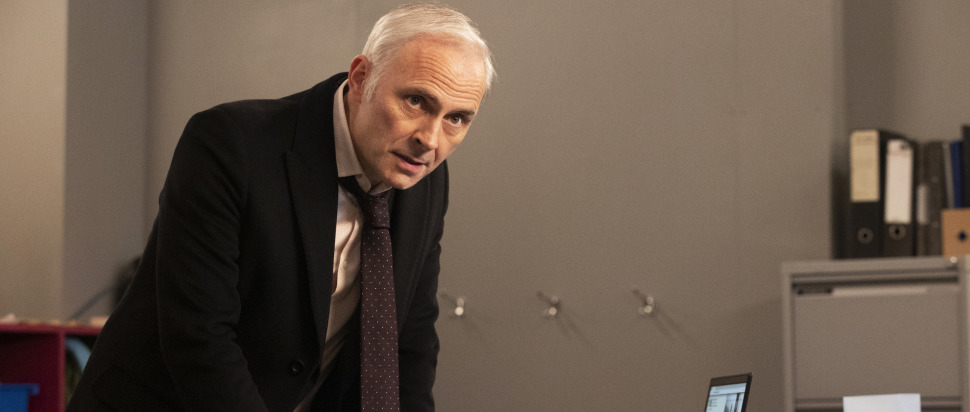Small Screen Scotland: Neil Forsyth on Guilt
Ahead of Edinburgh-set comic thriller Guilt returning for series two, we speak to writer Neil Forsyth about the show's word-of-mouth success
Scottish telly is pretty hot right now. BBC One’s drama à la mode is the daftly enjoyable Vigil, a submarine-set whodunit starring Suranne Jones and Rose Leslie as Glasgow detectives investigating some shady happenings onboard the UK's nuclear deterrent. It's going great guns on Sunday nights, debuting with over ten million viewers, making it easily the biggest new UK drama of the year. Another Scottish hit with a briny flavour is Annika, which stars Nicola Walker as a fourth-wall-breaking Maritime Homicide DI. The logline may sound like something found on Alan Partridge’s old dictaphone, but this skew-whiff crime drama is breaking viewing records on its channel Alibi.
Meanwhile Robert Florence and Iain Connell, the duo behind absurdist sketch show Burnistoun, look to have another cult comedy on their hands with The Scotts, a demented sitcom shot in the style of a glossy reality TV soap. And smaller in scale, but no less impressive, is the compassionate micro drama Float. Written by award-winning playwright Stef Smith, it tells, over six delicate ten-minute episodes, the tender love story that blossoms between two young women who find themselves stuck working as lifeguards at a smalltown pool.
The jewel of this recent glut of Scottish small-screen success though is Guilt, which aired on BBC Scotland and BBC Two in 2019. The first major drama from BBC Scotland, it’s a darkly hilarious moral satire that explores the unravelling of two Edinburgh brothers (played by Mark Bonnar and Jamie Sives) after they accidentally kill a man while driving home drunk from a wedding and scramble to avoid retribution. Over four twist-filled, hugely satisfying episodes, the brothers are put through the wringer as they attempt to keep the truth about the hit-and-run from ruining their lives.
Guilt was so good, in fact, it felt like a bit of a miracle that the underfunded BBC Scotland hit it out of the park on their first attempt. Speaking to Guilt’s writer, Neil Forsyth, on the phone ahead of the eagerly-anticipated Guilt 2, we get the sense that in some respects the channel’s budget limitations helped contribute to its sharp writing. “Guilt is quite a dramatically tight show,” he says. “There's not a huge number of locations, there's a lot of two-hander scenes. So it's not an all bells and whistles, big action thriller or anything. So instead you have to trust the performances – and hopefully the script – to tell a great story without feeling you have to have these huge flourishes for the sake of it.” This isn’t to suggest the show looks threadbare in any way. It wouldn’t look out of place in the company of a slick US series like Fargo or Breaking Bad.
Forsyth’s dialogue has the hard-boiled flavour of American crime fiction but it’s also extremely Scottish in its gallows humour and themes of duality (good and bad, rich and poor, saint and sinner), which fits snugly in the legacy of Caledonian antisyzygy that runs from Robert Louis Stevenson to Ian Rankin. It also makes vivid use of its Edinburgh setting.
“Edinburgh is a physically stunning place,” Forsyth says, “and I'm probably about the hundredth writer to talk about the light and shade between the New Town and Old Town.” Forsyth knows the Scottish capital well. He grew up in Dundee but began his writing career there while also tending bar at The Three Sisters pub to pay the bills. “I'm very fond of the city, and I wanted to get as much of it on-screen as possible?”
Guilt's Scottishness hasn’t dampened its appeal abroad; the show is proving to be a similar word-of-mouth triumph over in the States. Forsyth puts some of this success down to Guilt’s specificity. “You're trying to thread a needle, where you're trying to create something that was very of itself in terms of locality,” he explains. “The only place this show could be set is Edinburgh and Leith, and that has to feel very authentic. But you also want it to have a universality of storytelling and characters that could be understood and enjoyed all around the world.”
That’s easier said than done. But one of Forsyth’s shortcuts to compelling storytelling is having the audience in mind when he sits down to write. “I think about my viewer as someone who has knocked their pan in all day at a job, maybe one they don't particularly enjoy, and they're sat down at night with a drink. They've looked at the schedule, found this thing called Guilt, and they think, ‘well let's give this ten minutes.’ And that's the viewer I always think about. I try and give them a reason to keep watching after that first ten minutes and draw them in through storytelling and character. That's certainly an ambition.”
We reckon Forsyth has succeeded in this endeavour. We defy anyone to watch the first ten minutes of Guilt and not be desperate to see it through to its gut-punching close.
Guilt is available to watch on iPlayer; Guilt 2 screens from 12 Oct on BBC Scotland and BBC Two
Vigil, The Scotts and Float are all available on iPlayer
